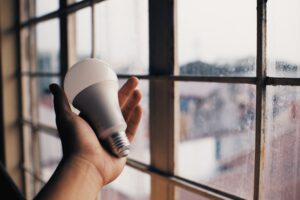Create Energy-Saving Habits
Our electricity consumption is frequently inefficient, and we regard energy conservation as a costly and time-consuming endeavor.
We may be unintentionally wasting energy and adding to greenhouse gas emissions. When not in use, everyone should get into the habit of turning off appliances, light bulbs, and fans.
Energy conservation will benefit both our lifestyle and our finances.
It should be highlighted that the use of renewable energy sources raises electricity prices. Climate change is accelerating, as are the threats that come with it, which is worrying. Is it necessary to form habits in order to save energy? Yes, that is necessary.
Science shows that there is a growing need for a sustainable ecosystem all around us.
When we begin to care about a sustainable environment, our worldview shifts. We also become completely aware of our actions. We need less energy to do the same tasks when we practice energy-saving behaviors.
However, in order to improve our energy efficiency, we must be conscious of how much energy we use and waste on a daily basis.
How to Form Energy-Saving Habits
1. Cover your kettle and pot with a lid: We frequently leave the pot or kettle on the heat without covering it. Cook with caution despite the pressure from now on; use a lid on your pot and watch the meal finish quickly and with less energy. Energy is used by a hot pot or kettle.
2. Be aware of leaky faucets: A faucet can drip most of the time, and we can leave it running for nearly a month before calling a plumber. We are more inclined to turn off the water if we consider the cost of our water bill or the lifespan of our water pump.
When showering, brushing their teeth, or shaving, some people keep the water running. This is an erroneous method. We squander a lot of water, yet when we turn off the faucet, we save water. It is recommended to wash in a bowl to reduce water waste.
3. Use energy-saving bulbs: If you still have regular light bulbs, replace them immediately with energy-saving bulbs. They use an exceptionally large amount of electricity. As a result, your energy consumption will be significantly lowered. Some individuals may be apprehensive about the cost of energy-saving bulbs, but the investment is well worth it.
4. Know when to open and close your curtains: It's advisable to draw your curtains and blinds in front of your windows at night and open them during the day. Open your windows and blinds during the day to let in plenty of fresh air.
This both heats the space and removes odors. It also allows for the sun, particularly early morning sun, which provides vitamin D.
Raising the blinds at night keeps the heat in and keeps us safe from inclement weather. We save money because of the health benefits. It is best to keep the blinds closed throughout the summer. This keeps the sun from warming the planet. When you leave the house, though, close your curtains.
5. Use light-reflecting materials to paint the house: The next time you repaint, use semi-gloss or semi-gloss paint on the wall surfaces. Because this type of paint reflects light, you may illuminate your rooms with fewer light bulbs.
6. Use energy-efficient appliances: Using energy-efficient appliances saves money. It is best to replace old appliances with new ones. Look for the Energy Star label when choosing energy-efficient equipment.
The Energy Star label guarantees that the equipment consumes less energy. Energy-efficient appliances typically use half the amount of energy than regular appliances use.
7. Unplug the device when not in use: Many people wonder, “How will this affect my energy savings?” Appliances plugged into a wall outlet use very little energy even when the switch is turned off and they are not in use. Unplugging the equipment is therefore the best solution. This will assist to extend the life of the device.
8. Home automation: If you automate your home and employ intelligent home controls, you will have more control.
You can turn off the light bulb you forgot to turn off from anywhere using your cell phone or laptop.
If you can afford smart integration, this is a great way to keep your home appliances from turning on when you are not home. The control of your home will be in your hands.
If we use these new behaviors, we will benefit the environment. We can assist lessen global warming and its repercussions in this way. We will benefit personally as well, such as decreased energy expenses and possibly avoiding health concerns.
The post Create Energy-Saving Habits appeared first on https://gqcentral.co.uk







Comments are closed